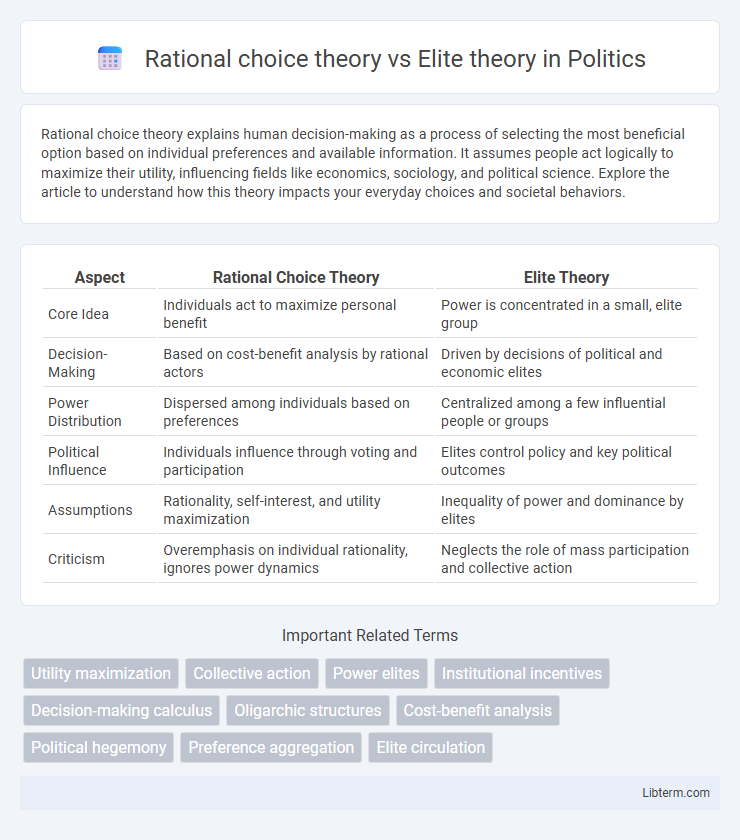Rational choice theory explains human decision-making as a process of selecting the most beneficial option based on individual preferences and available information. It assumes people act logically to maximize their utility, influencing fields like economics, sociology, and political science. Explore the article to understand how this theory impacts your everyday choices and societal behaviors.
Table of Comparison
| Aspect | Rational Choice Theory | Elite Theory |
|---|---|---|
| Core Idea | Individuals act to maximize personal benefit | Power is concentrated in a small, elite group |
| Decision-Making | Based on cost-benefit analysis by rational actors | Driven by decisions of political and economic elites |
| Power Distribution | Dispersed among individuals based on preferences | Centralized among a few influential people or groups |
| Political Influence | Individuals influence through voting and participation | Elites control policy and key political outcomes |
| Assumptions | Rationality, self-interest, and utility maximization | Inequality of power and dominance by elites |
| Criticism | Overemphasis on individual rationality, ignores power dynamics | Neglects the role of mass participation and collective action |
Introduction to Rational Choice Theory and Elite Theory
Rational Choice Theory explains social behavior through individuals making decisions that maximize personal benefits based on calculated preferences and available information. Elite Theory contrasts this by emphasizing that power and decision-making are centralized in a small, cohesive group of elite individuals who dominate political and economic systems. Both theories offer distinct frameworks for understanding the distribution of power and decision processes within societies.
Historical Origins and Development
Rational choice theory emerged in the early 20th century, rooted in economic principles emphasizing individual decision-making based on cost-benefit analysis and utility maximization. Elite theory originated in the early 1900s, influenced by sociologists like Vilfredo Pareto and Gaetano Mosca, focusing on the persistent dominance of a small, powerful minority in political and social structures. Both theories evolved through academic debates on power distribution but differ fundamentally in their focus on individual rationality versus structural elite control.
Core Principles of Rational Choice Theory
Rational choice theory centers on the premise that individuals act based on calculated decisions to maximize their personal advantage, emphasizing utility maximization, cost-benefit analysis, and individual preference ranking. It assumes rational behavior where actors evaluate options systematically to achieve the most beneficial outcome. In contrast, elite theory focuses on the dominance of a small, privileged group wielding power and controlling resources, highlighting structural inequalities rather than individual decision-making processes.
Fundamental Tenets of Elite Theory
Elite theory asserts that society is divided between a small, cohesive elite class that holds concentrated power and the masses who have little influence, emphasizing the inevitability of unequal power distribution. This theory highlights the role of elite networks in controlling political, economic, and social institutions to maintain their dominance and limit mass participation in decision-making. Unlike rational choice theory, which focuses on individual self-interest and strategic decision-making, elite theory centers on structural power dynamics and the persistence of elite rule.
Methodological Approaches Compared
Rational choice theory employs a micro-level, individual-based methodological approach, utilizing game theory and formal models to analyze decision-making processes aimed at maximizing utility. In contrast, elite theory adopts a macro-level perspective, relying on historical analysis, qualitative case studies, and sociopolitical data to examine power concentration within a small, influential group. The differing methodologies reflect rational choice theory's emphasis on individual rationality and strategic interaction, whereas elite theory prioritizes structural power dynamics and societal hierarchy.
Applications in Political Science and Sociology
Rational choice theory is widely applied in political science to analyze voter behavior, electoral competition, and policy-making by modeling individuals as utility-maximizers making strategic decisions. Elite theory, prominently used in sociology, examines power distribution within societies, highlighting how a small group of elites controls resources and influences political institutions regardless of democratic processes. Both theories provide critical frameworks for understanding political dynamics, with rational choice explaining individual decisions and elite theory emphasizing structural inequalities in power.
Strengths and Limitations of Rational Choice Theory
Rational Choice Theory excels in providing clear, mathematical models that predict individual behavior based on utility maximization, making it highly valuable in economics and political science. Its primary limitation lies in oversimplifying human decision-making by assuming complete information and rationality, often neglecting emotional, social, and institutional factors. This reductionist approach contrasts with Elite Theory, which emphasizes the impact of powerful groups but lacks the precise predictive power of Rational Choice Theory.
Criticisms and Challenges Facing Elite Theory
Elite theory faces criticism for its perceived underestimation of the public's role in political decision-making and overemphasis on a small, cohesive elite controlling power. Critics argue elite theory overlooks the complexities of democratic participation and social pluralism, often simplifying power dynamics to a single elite group. The challenge remains to reconcile elite dominance with empirical evidence of political contestation and influence from diverse societal actors.
Case Studies: Real-World Examples
Rational choice theory is illustrated by voting behavior studies, such as Anthony Downs' analysis of electoral participation, where individuals weigh costs and benefits before voting. Elite theory is exemplified by C. Wright Mills' examination of the power elite in the United States, demonstrating how a small group of political, military, and economic leaders dominate decision-making. Comparative case studies in countries like Brazil and South Africa reveal how elite networks influence policy outcomes, contrasting with rational choice models that prioritize individual decision-making.
Conclusion: Implications and Future Directions
Rational choice theory emphasizes individual decision-making based on cost-benefit analysis, highlighting the mechanisms behind collective behavior and policy outcomes, while Elite theory centers on the disproportionate influence of a small, powerful group shaping social and political structures. The future direction involves integrating these theories to better understand how elite preferences align or conflict with rational actions of individuals in complex systems, providing richer insights for political science and sociology. Emerging interdisciplinary research and advanced computational models will enhance empirical testing and application of these theories in addressing governance and inequality challenges.
Rational choice theory Infographic

 libterm.com
libterm.com